Advertisement
Jackfruit: What It Is + Why You're Going To Want To Eat It All Summer


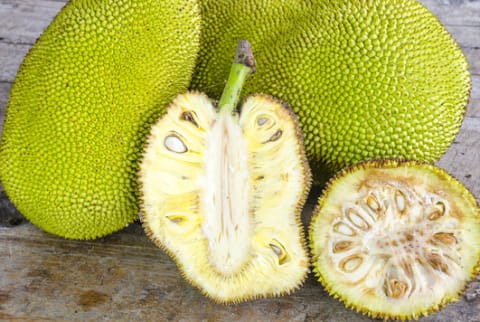
The jackfruit looks exactly like your crayon depiction of the monster under your bed when you were little. Typically weighing in between thirty and fifty pounds, it's the world's largest tree fruit. With its craggy green skin, it's the Incredible Hulk. It's menacing. And it gives off somewhat of a putrid scent.
Don't be fooled, though: As with so many fruits with tough exteriors (lookin' at you, pineapple), it's got a soft and friendly interior. In fact, it's incredibly sweet, almost like candy.
What is it?
Most people haven't heard of it—except for vegans—but it's starting to make its way around the wellness world. As many of us try to cut back on eating meat (for health or environmental reasons), we're finding our protein from other sources like nuts, beans, and quinoa. And we're always looking for the next best thing.
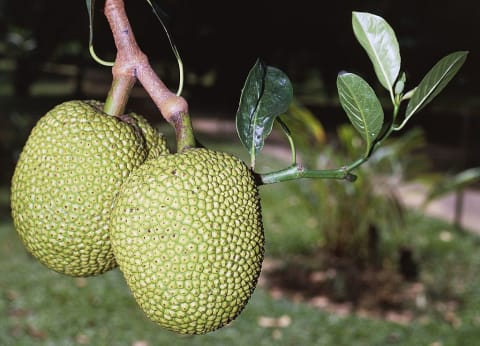
And that thing is the jackfruit, native of South and Southeast Asia. Not only is it rich in protein, it's also packed with potassium, magnesium, vitamin B, and vitamin C. And with about 95 calories in about a half a cup, it isn't quite as high-carb or caloric as other staple sources of protein, like rice or corn.
How do I eat it?
It can be eaten raw when it's ripe, soft and fruity, as a dessert (on its own or atop something else, like ice cream or pudding). It can also be served unripe, when it isn't sweet yet and has a meatier texture, in savory dishes like curries or jackfruit "carnitas" or "pulled pork"—in which case it's cooked.
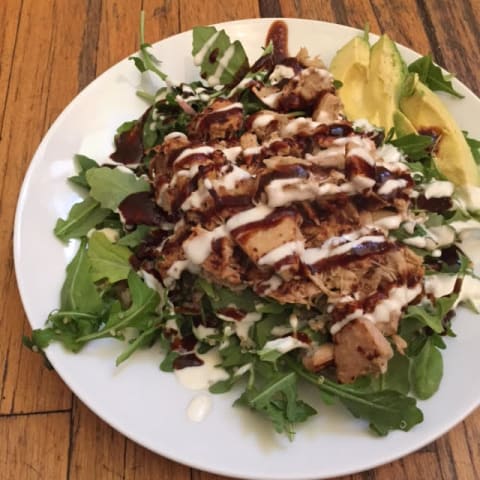
The seeds—which hold most of the fruit's protein—can be peeled and boiled like your standard legume. In Southeast Asia, they're dried and ground into curry, stir fry, juice, chips, ice cream, and even baking flour. To say it's versatile would be an understatement.
Where can I find it?
In the U.S. jackfruit has yet to go mainstream. It's mostly sold in specialty shops, like Asian markets and natural food stores, which also carry them canned in brine.
But perhaps the most promising development for jackfruit in the domestic market is going down at Upton's Naturals, a vegan meat-alternative company in Chicago. Last year, they introduced a line of packaged, ready-to-eat, preseasoned, young jackfruit. The Jackfruit Company is doing something similar—with flavors like curry and teriyaki—and their products are available at Whole Foods.
How do I prepare it?
Our favorite that we've tried so far comes from Chickpea & Olive, a vegan pop-up restaurant in New York City, which makes the most amazing pulled BBQ jackfruit sandwich. Smothered in BBQ sauce, its taste and mouthfeel are almost identical to pulled pork's.
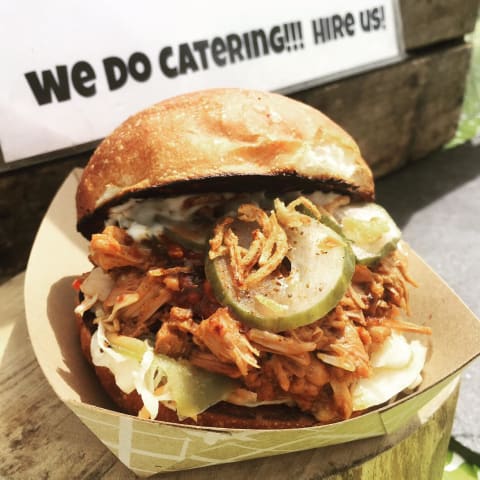
So, naturally, we asked the dynamic duo behind Chickpea & Olive, Danielle Ricciardi and Daniel Strong, to give us some jackfruit pointers. They wouldn't give up their pulled jackfruit recipe, but they let us have jackfruit carnitas instead (recipe below!).
"We recommend using canned young jackfruit in brine," Danielle told us. "Ripe jackfruit is very tasty and not so difficult to work with, but it is sweet, soft, and doesn’t hold up very well to cooking. Fresh young jackfruit on the other hand is a messy ordeal, full of a very sticky resin, that is a nightmare to clean.
"This is the jackfruit that is perfect for savory preparations, but save yourself a disaster in the kitchen, and get a prepared product."
But if you're determined to hack one open yourself (don't!), Strong recommends wearing a disposable glove, an apron or smock, working on the floor with a drop cloth, and having an open dish of liquid coconut oil at the ready. Rub a little oil on your bread knife and cut off the top and bottom of the fruit. Stand it up on its base like a pineapple, and cut off strips of the prickly skin, slicing from top to bottom, applying oil to the knife after each cut.
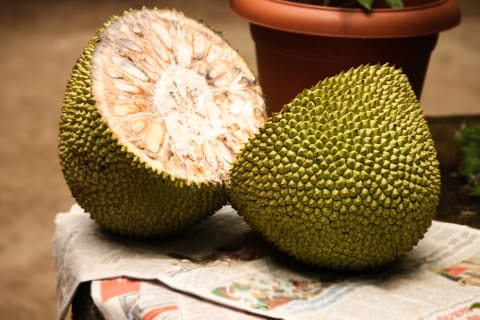
Now that you've made a huge mess, get the now-naked jackfruit on a roasting pan. Make a braising liquid by adding a quart of water, a cup of coconut oil, and a 1/2 cup of nutritional yeast to the roasting pan. He suggests adding a few cloves of garlic, a quartered onion, and a carrot chopped into some big chunks. You could also rub the jackfruit with a spice rub.
Put a lid on the roasting pan, or some foil, and bake the whole thing (if you can fit it) in the oven for three hours at 400 degrees. Then remove from oven and let it cool, before shredding it with a pair of forks. Throw it on a bun with some cole slaw and you're good to go.
But again, Strong warns, the resin from the jackfruit is very difficult and unforgiving stuff. It can stain your clothes and it sticks to everything. If you get it in your hair, it's like bubble gum, so go get the peanut butter. And the fruit itself is hard to cut. Your best bet is probably with a machete.
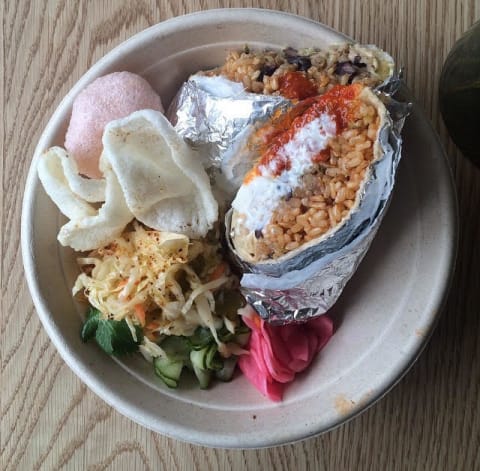
Chickpea & Olive's Jackfruit Carnitas
Serves 4
Ingredients
- 2 (20oz) cans young jackfruit in brine, drained and broken up until it looks like pulled chicken. do this in a mixing bowl with enough room to fit all of the ingredients.
- 2 oz nutritional yeast
- 1/4 cup plus 1 teaspoon coconut oil
- kosher salt, to taste
- 1 medium onion, chopped
- 1/4 cup cilantro, chopped
- 4 cloves garlic, chopped
- 1/4 cup orange juice (an orange called “naranja agria” works best, but if you can’t find it, add the juice of half a lime, and cut the other half into segments to garnish/squeeze on at the end)
- 1/4 teaspoon ground cumin
- 1/4 teaspoon cinnamon
Preparation
1. Drain and rinse the jackfruit, and then break it up. A potato masher works well for this, but we use an 80qt mixer with a wire whisk attachment to break the fibers off the core of the fruit.
2. Preheat the oven to 400 degrees and start heating a cast iron pan over medium heat.
3. Add the teaspoon of coconut oil, the garlic, and the onions to the pan.
4. As the onions brown, add a 1/4 cup of water and then let it boil off before lowering the heat.
5. Mix the rest of the ingredients except the jackfruit in to the pan.
6. Pour the contents of the pan over the jackfruit and mix until thoroughly incorporated and well seasoned. Use about a tablespoon of salt.
7. Take the contents of the bowl and return it to the pan.
8. Put the whole mess in the oven and let it bake for 35 minutes, until golden and crusty.
You can do all kinds of fun stuff with this recipe. It's great with rice and beans better still in a burrito (see above), or just with a little pico de gallo in a taco, or a little salsa verde and Anita’s coconut yogurt.